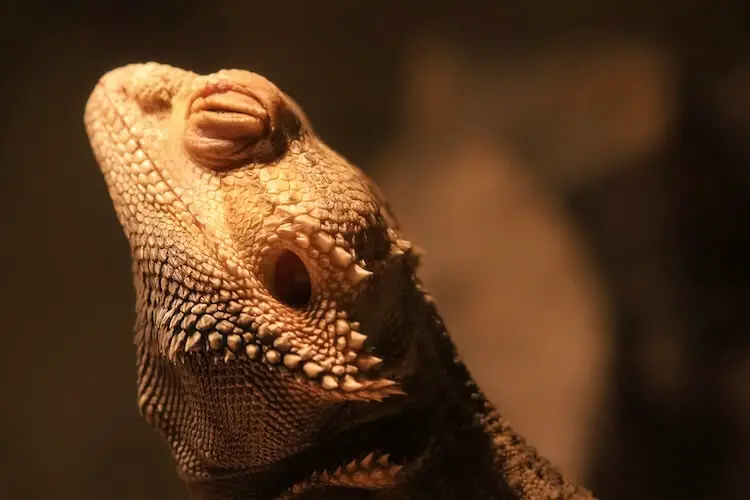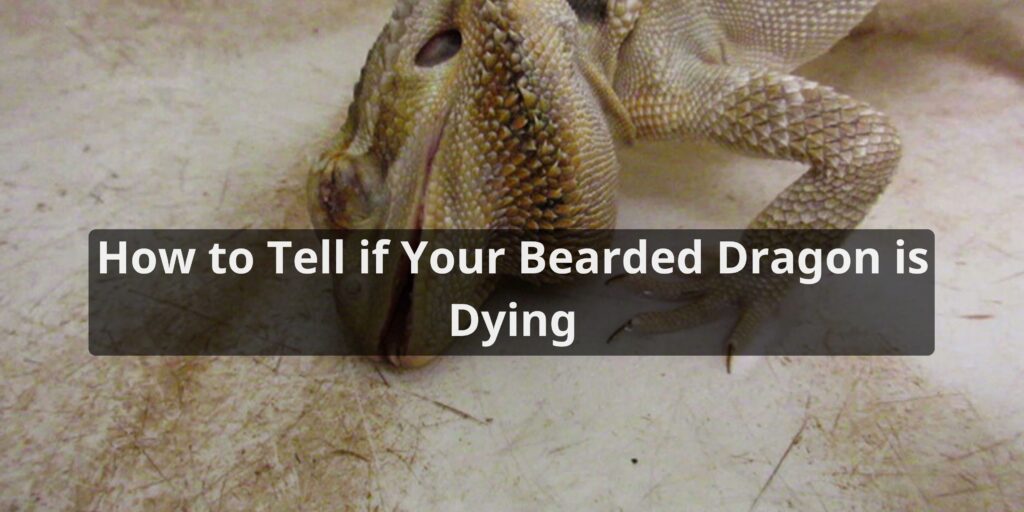Determining if your bearded dragon is nearing the end of its life can be difficult, but there are some key signs to look out for. As a pet owner, keeping a close eye on your bearded dragon’s health and behavior is important to ensure they live a long, healthy life. This article will go over the primary indicators that how to tell if your bearded dragon is dying and provide information on caring for an aging or sick dragon.
Changes in Appearance and Behavior

Some of the most telling signs that a bearded dragon is ill or dying are changes in its appearance and normal behavior. How to tell if your bearded dragon is dying often starts with subtle shifts before becoming more pronounced over time. Here are some changes to look out for:
- Lethargy and loss of appetite. Healthy dragons are relatively active and eager to eat. A dying dragon will begin eating less and moving around very little.
- Changes in body condition. Significant weight loss, muscle wasting, or bony prominence along the spine or hips may indicate organ failure or cancer.
- Increased time basking under heat lamps. This can signify pain, discomfort, or difficulty regulating body temperature.
- Labored breathing, gasping, or wheezing. This points to respiratory distress, which is a serious health problem.
- Discolored or abnormal urates. The white chalky part of a bearded dragon’s droppings offers clues on hydration and organ function.
- Increased soaking in the water dish. This behavior helps boost hydration but also indicates the dragon isn’t getting enough fluids from eating greens and prey.
- Skin dullness and shedding issues. Healthy dragons have vibrant skin. Dying dragons often won’t shed properly.
- Swollen joints, limbs, or belly. This swelling is abnormal and suggests organ problems.
- Dark spots or lesions on the skin. These may be signs of infection or cancerous tumors.
Any major deviation from your bearded dragon’s normal appetite, activity levels, or appearance warrants an immediate vet visit to identify the cause. With early treatment, many conditions can be managed to extend a dragon’s life.
Caring for an Aging or Sick Bearded Dragon
How to tell if your bearded dragon is dying is just the first step – you’ll also need to adapt their care plan to their condition. Here are some tips for caring for an ill, elderly dragon:
- Make foods easy to eat. Chop veggies small, purée greens, and cut prey into bite-sized pieces.
- Hand feed them as needed. Gently open the mouth and place softened foods directly inside to encourage eating.
- Increase hydration. Provide fresh water daily. Give oral fluids prescribed by a vet if dehydrated. Mist more frequently.
- Adjust heat and UVB lighting. Raise basking spot temperature to 100-105°F. Ensure UVB bulb is working properly.
- Address pain and discomfort. Consult a vet about appropriate pain medication if needed.
- Keep their habitat clean. Scoop poop, wipe surfaces, and replace substrates frequently to prevent infection.
- Watch for pressure sores. Gently reposition a weak dragon that stays in one spot. Pad their habitat.
- Limit stress. Keep handling gentle. Maintain consistent lighting cycles and habitat conditions.
- Schedule regular vet checkups. Have tests run to monitor organ changes and catch problems early.
- Consider euthanasia. If a dragon is suffering greatly without quality of life, humane euthanasia may be the kindest option.
Providing thoughtful, gentle care tailored to your aging or sick bearded dragon’s needs can help them enjoy comfort in their final days or months. Work closely with an exotics vet to make the best decisions for your pet’s welfare.
Conclusion
How to tell if your bearded dragon is dying comes down to paying close attention for significant changes in their energy levels, appetite, movements, breathing, appearance, and waste elimination. If you spot any concerning signs, bring them to a qualified reptile vet right away for diagnosis and treatment. With attentive care and medical support when appropriate, you can keep your bearded dragon as comfortable as possible through their senior years or any illness. Monitor their health diligently, adapt their habitat and diet as needed, and cherish the remaining time with your scaly family member.
FAQs About How to Tell if Your Bearded Dragon is Dying
Are there specific behaviors that indicate a bearded dragon is nearing the end of its life?
Behaviors like extended periods of inactivity, reluctance to eat or drink, and reduced interaction with their environment can suggest a bearded dragon is approaching the end of its life. However, these behaviors are not definitive, so consulting a veterinarian is recommended.
How do I know if my bearded dragon’s condition is irreversible and they won’t recover?
A veterinarian can assess the irreversibility of your bearded dragon’s condition through a thorough examination and possibly diagnostic tests. They can provide insights into the prognosis and whether any interventions are feasible.
What role does age play in determining if a bearded dragon is approaching the end of its life?
Age is a factor, but not the sole determinant. While older bearded dragons may be more prone to age-related issues, younger dragons can also face severe health problems. Consider overall health and consult a vet for a better assessment.
Should I seek veterinary care if I think my bearded dragon is dying, or is it often too late?
Seeking veterinary care is crucial, even if you suspect your bearded dragon is dying. Veterinarians can provide palliative care and make the transition more comfortable. Waiting may result in unnecessary suffering.
Are there any specific signs or behaviors that indicate a peaceful passing for a bearded dragon?
A peaceful passing may involve decreased movement, closing of the eyes, and shallow, regular breathing. Be present for your pet, keeping them comfortable and warm during this time. Euthanasia can also be considered if their suffering becomes pronounced. Consult your vet for guidance.



